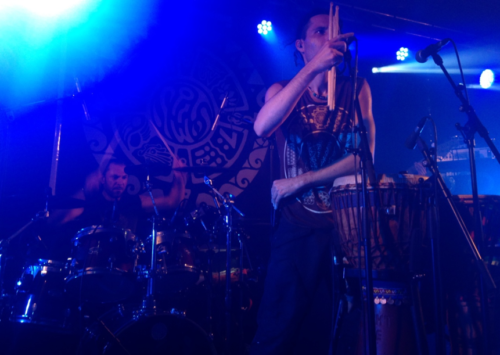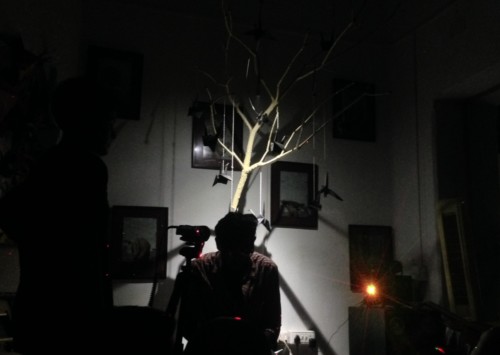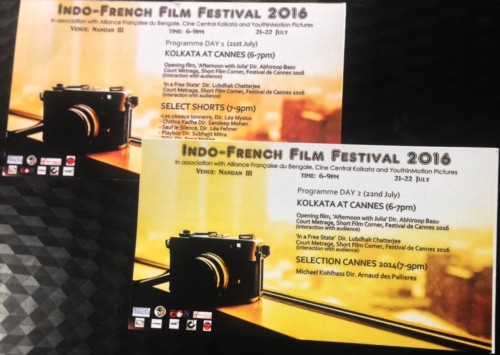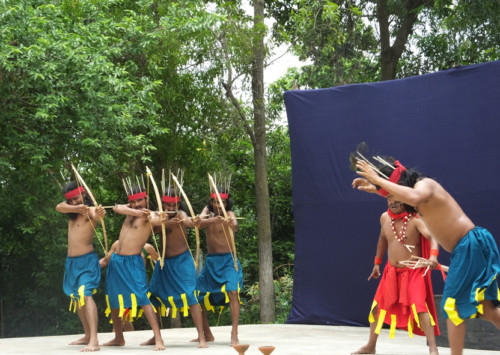Butoh: Avant-garde theatre finds a space in Kolkata
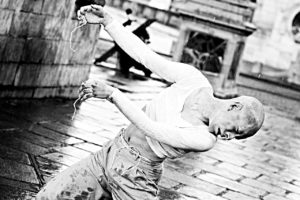
Butoh is being manifested in different forms across the globe, including in Kolkata, India. Image via Flickr,Duc
The Japanese dance-theatre form, Butoh is slowly finding a place in the cultural space of Kolkata, with upcoming festivals such as the 2nd Kolkata International Butoh Festival serving as platforms for the promotion of the art.
Butoh can be best understood as a performative dance or movement in the space of theatre with performers traditionally appearing on stage with white make-up across the body and movements that are controlled very precisely. Not a theatre form that is aesthetically and philosophically appreciated by all, or easily defined, this avant-garde form has a disputable point of origin. However, most agree that it surged following World War II, in Japan, with key ‘founders’ such as Hijikata Tatsumi, was the turning and starting point for the modern to postmodern foundation of the art.
Kolkata, the capital of eastern Indian state of West Bengal, has found this expressive form of performance art interesting, creating an existence in the city, although the circle is small. “Butoh is finding a space in the city which was otherwise becoming stagnant in its theatrical forms. Although there have not been too many practitioners in the past, with the commencement of the annual Kolkata International Butoh Festival last year, I think Butoh will be more accessible and therefore understood,” states Sudipta Dawn, Director of Culture Monks, which collaborated with others to create this festival. Organisations such as Culture Monks have brought forth theatre nights with Butoh performers in the past, in spaces such as the French cultural centre Alliance Française du Bengale.
In the upcoming 2nd Kolkata International Butoh Festival, Butoh, both as a radical movement and dance form is being given a space. Some of the events slated for the festival, which is being organised by Culture Monks, Alliance Française du Bengale, Creative Arts Studio and others, are street performances, collaborative performances as well as joint productions. “Because of its expressive nature, which is also highly therapeutic, Butoh is becoming a voice for housewives and students alike, who are some of the people who come and attend these workshops,” stated Dawn, adding, “The collaborative performances are aimed at being a space for those looking to express and we are open to people joining. Those interested can get in touch with me or the organisation as the performances will take place over a while.”
One of the most awaited events within the festival is the workshops by Rhizome Lee, on January 10-12 at Creative Arts Studio as well as January 14-15 at Sparsh Studio, which is a more extensive one. Lee, a Butoh Master, who was born and trained in Japan, is also the founder and director of the Subbody Butoh School, which is based in Dharamsala, in the northern Indian state of Himachal Pradesh. “Butoh is a space for the self, to address points of conflict and these kind of festivals also become a space of convergence and exploration of projects for artists getting together,” stated Dawn. Sanghamitra Deb, an upcoming actor and dancer who was hoping to attend the festival, stated that although she hadn’t practised Butoh intensively, “It does help in performance because it opens the mind, and helps in observation and empathy, necessary traits for a performer. The body also becomes ready in the process.”
Butoh in evolution
The sense of aesthetic in Butoh, radical in nature, finds appreciation in limited sensibilities, but it is also evolving with time. “Butoh is a becoming a choice for those who find its uniqueness attractive, those who have an interest in exploring different forms as well as for the physical rather than textual performer,” shared Dawn. Deb is not worried about its current underground standing however, adding her concerns on the growth of Butoh, she said, “I just hope it doesn’t lose itself in the process of making itself more accessible to urban masses.”
Even with a changing socio-political scape since the time this theatre-dance form found a strong base, Butoh remains relevant and is explored by young artistes in Kolkata as a mode of expression. Describing what Butoh meant to her, Deb stated, “It is a form of movement which came out of devastation, death and destruction. So, it looks like every thing is falling apart, like chaos. But like any kind of chaos, there is intense order, and strength within Butoh, which basically comes from one’s own personal discipline, of harmony between body and mind.” For those looking to explore this dance-theatre of the inner self, the 2nd Kolkata International Butoh Festival is a great space to look forward to.
For more details on the festival visit Culture Monks or contact Sudipta Dawn at +91-8697919308

